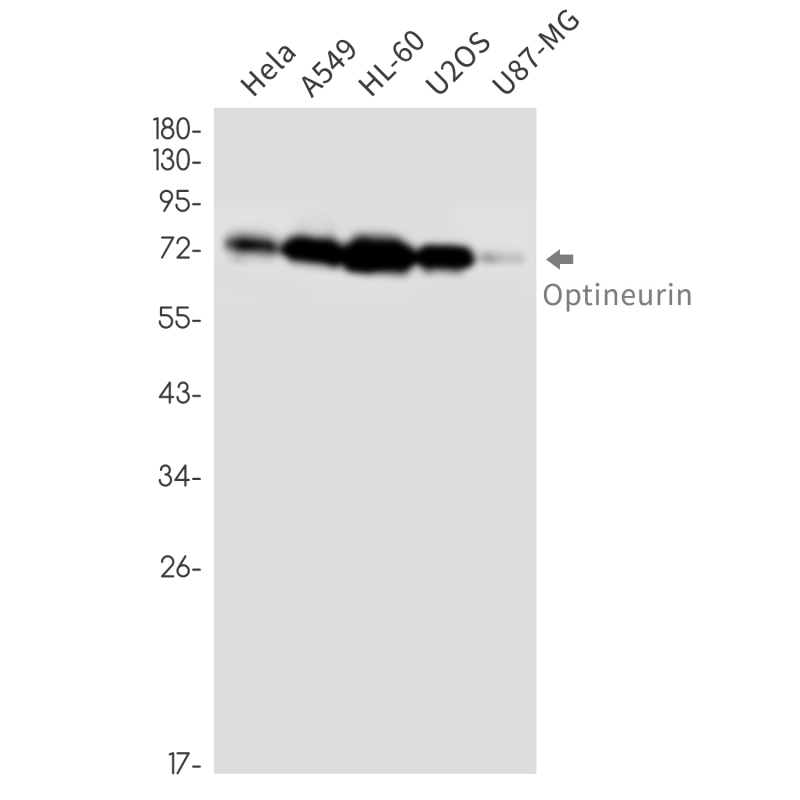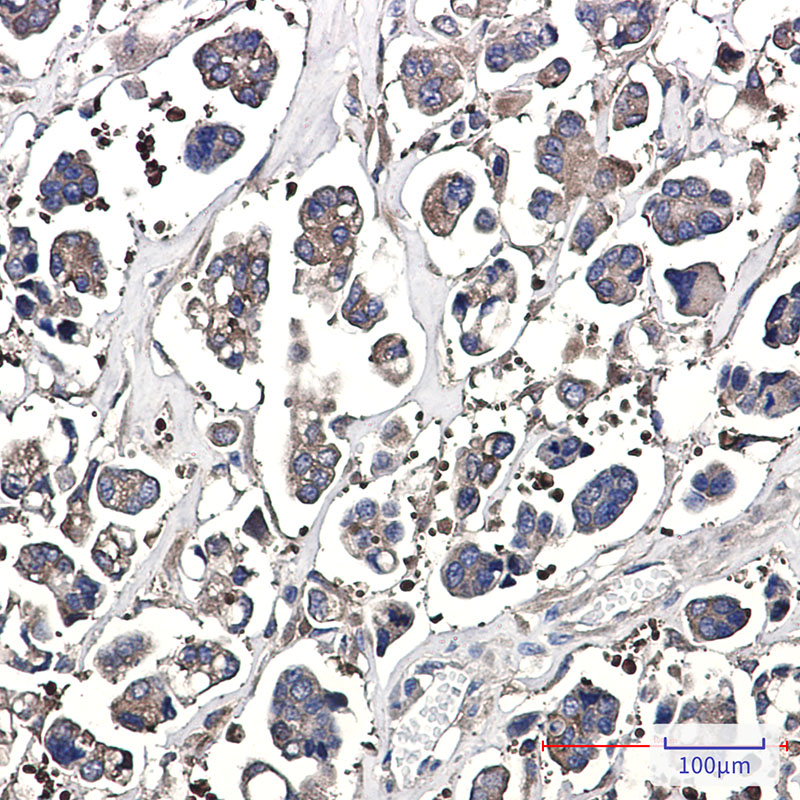

| WB | 1/500-1/1000 | Human,Mouse,Rat |
| IF | 咨询技术 | Human,Mouse,Rat |
| IHC | 1/50-1/100 | Human,Mouse,Rat |
| ICC | 技术咨询 | Human,Mouse,Rat |
| FCM | 咨询技术 | Human,Mouse,Rat |
| Elisa | 咨询技术 | Human,Mouse,Rat |
| Aliases | NRP; FIP2; HIP7; HYPL; ALS12; GLC1E; TFIIIA-INTP |
| Entrez GeneID | 10133 |
| WB Predicted band size | Calculated MW: 66 kDa; Observed MW: 75 kDa |
| Host/Isotype | Rabbit IgG |
| Antibody Type | Primary antibody |
| Storage | Store at 4°C short term. Aliquot and store at -20°C long term. Avoid freeze/thaw cycles. |
| Species Reactivity | Human |
| Immunogen | Recombinant protein of human Optineurin |
| Formulation | Purified antibody in TBS with 0.05% sodium azide,0.05%BSA and 50% glycerol. |
+ +
以下是关于Optineurin抗体的3篇参考文献及其摘要内容:
1. **文献名称**: *Optineurin in amyotrophic lateral sclerosis: Multifunctional adaptor protein at the crossroads of different neurodegenerative pathways*
**作者**: Maruyama H., Morino H.
**摘要**: 该研究探讨Optineurin(OPTN)在肌萎缩侧索硬化症(ALS)中的作用,通过免疫组织化学和Western blot分析发现,OPTN抗体在ALS患者脊髓中检测到异常蛋白聚集,提示其参与神经退行性病变的调控。
2. **文献名称**: *The role of optineurin in antiviral type I interferon production*
**作者**: Mankouri J., Fragkoudis R.
**摘要**: 文章利用Optineurin抗体进行免疫共沉淀实验,揭示了OPTN在抗病毒先天免疫中的关键作用,证明其通过调控干扰素信号通路抑制病毒复制。
3. **文献名称**: *Optineurin mutations in glaucoma: a systematic review*
**作者**: Rezaie T., Child A., et al.
**摘要**: 研究通过Western blot和免疫荧光技术,使用OPTN抗体分析青光眼患者的突变OPTN蛋白定位异常,表明其与视神经节细胞凋亡及疾病进展相关。
以上文献均通过Optineurin抗体揭示了该蛋白在疾病机制中的分子功能,涵盖神经退行性疾病、免疫反应及眼科病理等领域。
Optineurin, encoded by the *OPTN* gene, is a multifunctional adaptor protein involved in regulating cellular processes such as vesicle trafficking, autophagy, inflammation, and signal transduction. Initially identified as a binding partner for the GTPase Rab8. it interacts with diverse molecules, including Huntingtin, myosin VI, and Tank-binding kinase 1 (TBK1), facilitating its role in membrane trafficking and cargo recognition. Optineurin also acts as a ubiquitin-binding adaptor in selective autophagy, targeting damaged mitochondria or protein aggregates for degradation. Dysregulation of optineurin is linked to several diseases. Mutations in *OPTN* are associated with primary open-angle glaucoma, amyotrophic lateral sclerosis (ALS), and Parkinson’s disease. In ALS, optineurin’s impaired autophagy function may contribute to toxic protein accumulation, while in glaucoma, mutations disrupt its interaction with Rab8. affecting trabecular meshwork homeostasis.
Antibodies targeting optineurin are vital tools for studying its expression, localization, and post-translational modifications. They enable detection via techniques like Western blotting, immunofluorescence, and immunohistochemistry, helping to elucidate its role in disease mechanisms. For example, optineurin antibodies have revealed its cytoplasmic redistribution under stress or pathogenic conditions, or its phosphorylation by TBK1 during autophagy. These antibodies also aid in diagnosing *OPTN*-related disorders and evaluating therapeutic strategies aimed at restoring optineurin function. However, variability in antibody specificity requires careful validation to ensure accurate interpretation of experimental data. Overall, optineurin antibodies remain crucial for advancing research into neurodegeneration, ocular pathology, and autophagy regulation.
×